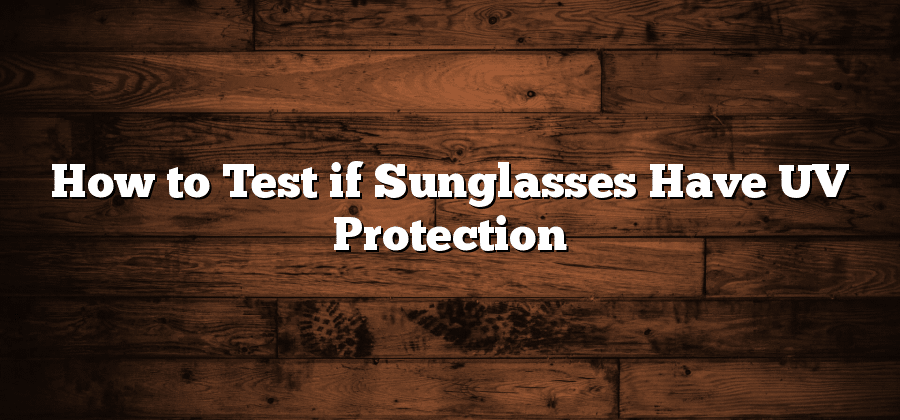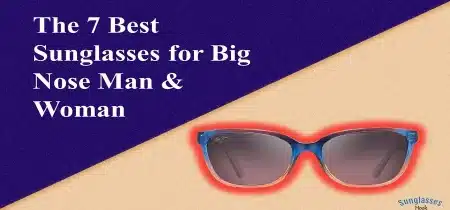It’s summertime and everyone’s wearing their favorite shades, but how do you know if those sunglasses have UV protection? The sun is one of the most powerful elements in nature and can cause damage to skin and eyes if we’re not careful. Fortunately, testing sunglasses for UV protection is relatively easy and can help you make sure you’re doing your part to protect yourself and your eyes.
Steps to Test Sunglasses Have UV Protection
The first and most important step in testing your sunglasses is to make sure they meet the standards set by the American National Standards Institute (ANSI). All sunglasses should have a label indicating their level of UV protection. The label should also indicate whether the lenses meet the ANSI requirements for UVA and UVB protection.
Once you’ve determined that the sunglasses meet the ANSI standards, the next step is to check the lenses for any physical damage. Damaged lenses can reduce the level of protection and should be replaced immediately. It’s also a good idea to check the frames for any damage as well, as this could also reduce the level of protection.
If you’re looking for an even more accurate test of your sunglasses’ UV protection, you can take them to an optometrist for a UV test. This test measures the amount of UV radiation that your eyes are exposed to when wearing the sunglasses. If the amount of UV radiation is too high, the optometrist can recommend a different pair of sunglasses.
In addition to testing the sunglasses for UV protection, it’s important to make sure they fit properly. Sunglasses that don’t fit correctly can allow more UV radiation to enter your eyes, which can be damaging. Make sure the sunglasses are snug against your face, with no gaps or openings that could potentially allow more UV radiation in.
Finally, it’s also important to make sure you’re wearing your sunglasses regularly. Studies have shown that even if your sunglasses meet the ANSI standards, you may still not be getting the full protection they offer if they’re not worn properly. Wearing your sunglasses regularly ensures that you’re getting the maximum UV protection and blocking out harmful rays.
Final Thoughts
Now that you know how to test if sunglasses have UV protection, you can enjoy your time outdoors without worrying about the damaging effects of the sun. Just remember to check the ANSI label, inspect the lenses for damage, and make sure the sunglasses fit correctly. With these tips, you can be sure you’re doing your part to protect your eyes and skin from the sun’s powerful rays.
Frequently Asked Questions
How do you test UV coating?
There are a few different ways you can test UV coating on sunglasses or other eyewear:
Use a UV flashlight: A UV flashlight, also known as a blacklight, can be used to test the UV coating on sunglasses. Simply turn off the lights and shine the flashlight on the lenses of the sunglasses. If the lenses fluoresce or glow under the light, this indicates that they have a UV coating.
Check the label: Many sunglasses and other eyewear will have a label or sticker indicating whether they have a UV coating. You can check for this label to determine if the eyewear has a UV coating.
Consult with a professional: If you are still unsure whether your sunglasses or other eyewear have a UV coating, you can consult with a professional eyewear technician. They can examine the eyewear and confirm whether or not it has a UV coating.
Overall, using a UV flashlight or checking the label are the most reliable ways to test UV coating on eyewear. If you are still unsure or if you want a professional opinion, you can always consult with a eyewear technician.
Do sunglasses block 100% of UV rays?
Most sunglasses are designed to block a significant amount of UV radiation, but it is rare for them to block 100% of UV rays. According to the American Academy of Ophthalmology, sunglasses that block 99-100% of UVA and UVB radiation are considered to be the most effective at protecting your eyes from harmful UV rays.
It’s important to keep in mind that sunglasses that block 100% of UV rays may not be necessary or practical for everyday use. It is more important to choose sunglasses that block a high percentage of UV rays and are comfortable and functional for your needs.
If you are concerned about protecting your eyes from UV radiation, you should look for sunglasses that are labeled as providing 100% UV protection or that meet the UV standards of the American National Standards Institute (ANSI). You should also consider wearing a hat or using other protective measures to further reduce your exposure to UV radiation
Is 100% UV protection the same as polarized sunglasses?
No, 100% UV protection and polarized sunglasses are two separate features that can be found in eyewear.
UV protection refers to the ability of sunglasses or other eyewear to block out UV radiation. Most sunglasses are designed to block a significant amount of UV radiation, but it is rare for them to block 100% of UV rays. Sunglasses that block 99-100% of UVA and UVB radiation are considered to be the most effective at protecting your eyes from harmful UV rays.
Polarized sunglasses, on the other hand, are designed to reduce glare. They do this by using a special filter that absorbs horizontally polarized light and reduces the amount of glare that reaches your eyes. Polarized sunglasses are particularly useful for activities such as driving, fishing, or participating in water sports, as they can help to reduce glare from reflective surfaces.
While both 100% UV protection and polarization can be beneficial features in eyewear, they serve different purposes. You can find sunglasses that offer both 100% UV protection and polarization, but it is also possible to find eyewear that offers only one or the other



Recent Comments